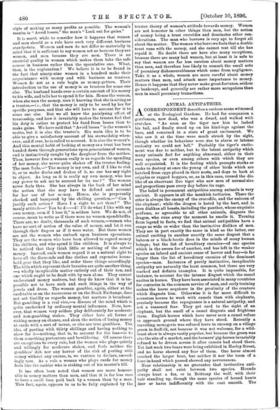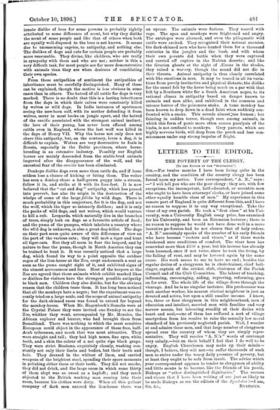ANIMAL ANTIPATHIES.
ACORRESPONDENT describes a curious scene witnessed at the Zoological Gardens. He had for companion a gentleman, now dead, who was a dwarf, and walked with crutches. " As soon as the tiger saw him he lashed his tail, and finally stood up on his hind-legs against the bars, and remained in a state of great excitement. We who saw it at the time were much struck by the sight, though whether its behaviour were due to alarm or intense curiosity we could not 'tell." Probably the tiger's excite- ment was due to neither, but to the latent antipathy which many animals feel for anything abnormal, either in their own species, or even among others with which they are well acquainted. It is the feeling which prompts storks or rooks to destroy at once the young of other birds which are hatched from eggs placed in their nests, and dogs to bark at cripples or ragged beggars, or, as in this case, roused the dis- like of an observant Zoo tiger who saw men of normal size and proportions pass every day before its cage.
The belief in permanent antipathies among animals is very ancient. It appears in all the monkish tertiaries. There the otter is always the enemy of the crocodile, and the unicorn of the elephant; while the dragon is hated by the hart, and in turn dislikes all beasts, including the panther, whose exquisite perfume, so agreeable to all other animals, disgusts the dragon, who runs away the moment he smells it. Turning from legend to facts, we find that animal antipathies have a range as wide or wider than the instinctive dislikes of men. They are in part exactly the same in kind as the latter, one animal exciting in another exactly the same disgust that a baboon or a black-beetle does in the minds of many human beings ; but the list of hereditary enemies—of one species which is the sworn foe of another, and has left in the weaker species an inbred and ancient sense of horror and fear—is far longer than the list of hereditary enemies of the dominant species—man. Instances of purely instinctive, inexplicable antipathy are naturally the least common, but there are very marked and definite examples. It is quite impossible, for instance, to account for the intense disgust which the camel excites in horses. They have been associated in many countries for centuries in the common service of man, and early training makes the horse acquiesce in the proximity of the creature which disgusts him. Otherwise it is far more difficult to accustom horses to work with camels than with elephants, precisely because the repugnance is a natural antipathy, and not a reasoned fear. They get used to the sight of an elephant, but the smell of a camel disgusts and frightens them. English horses which have never seen a camel refuse to approach ground where they have stood. Recently a travelling menagerie was refused leave to encamp on a village green in Suffolk, not because it was not welcome, for a wild- beast show is always vastly popular, but because the green was also the site of a market, and the farmers' gig-horses invariably refused to be driven across it after camels had stood there. Yet last week two bears were being exhibited in Harley Street, and no horse showed any fear of them. One horse almost couched the larger bear, but neither it nor the team of a four-in-hand which passed showed any nervousness.
Near relationship is no guarantee that instinctive anti- pathy shall not exist between two species. Hounds always hunt a fox, or in Brittany the wolf, with their hair standing up, though the same species of hound hunts deer or hares indifferently with the coat smooth. The innate dislike of bees for some persons is probably rightly attributed to some difference of scent, but why they dislike the scent of some people and like that of others when both are equally well-disposed to the bees is not known. It seems due to unreasoning caprice, to antipathy, and nothing else. The dislikes of dogs and cats for certain people are probably more reasonable. They divine, like children, who are really in sympathy with them and who are not; neither is this a very difficult task, for most people are far more demonstrative with animals than they are when desirous of conciliating their own species. •
From these antipathies of sentiment the antipathies of inheritance must be carefully distinguished. Many of these can be explained, though the motive is less obvious in some oases than in others. The hatred of all cattle for dogs is very marked. There is no doubt that this is a lasting inheritance from the days in which their calves were constantly killed by wolves or wild dogs. In India instances of sportsmen seeing the new-born calf, with its mother defending it from wolves, occur in most books on jungle sport, and the hatred -of the eanicim associated with the strongest animal instinct, the love of their young, has never been effaced among cattle even in England, where the last wolf was killed in the days of Henry VII. Why the horse not only does not share this antipathy, but, on the contrary, loves a dog, it is difficult to explain. Wolves are very destructive to foals in Russia, especially in the Baltic provinces, where horse- 'breeding is an extensive industry. Possibly our English horses are mainly descended from the stable-bred animals imported after the disappearance of the wolf, and the ancestral fear of the can idm has been eliminated.
Donkeys dislike dogs even more than cattle do, and if loose -seldom lose a chance of kicking or biting them. The writer has seen a donkey chase a half-grown puppy into a stream, blow it in, and strike at it with its fore-feet. It is now believed that the " cat and dog " antipathy, which has passed into proverb, has also its origin in the destruction of the whelps of some of the large fetid by wild dogs. There is ,much probability in this conjecture, for it is the dog, and not the wolf, which the tiger so intensely dislikes ; and it is only the packs of wild dogs, and not wolves, which would venture to kill a cub. Leopards, which naturally live in the branches of trees, simply look on dogs as a favourite article of food ; and the puma of the pampas, which inhabits a country where the wild dog is unknown, is also a great dog-killer. The dogs on their part seem quite aware of this difference of view on the part of the various cats ; they will mob a tiger and hunt all tiger-cats. But they all seem to fear the leopard, and by nature to fear the puma, though in North America they can be trained to hunt it. It was recently noticed that a large .dog, which found its way to a point opposite the outdoor cages of the lion-house at the Zoo, crept underneath a seat as soon as the puma caught sight of it, and exhibited signs of the utmost nervousness and fear. Most of the keepers at the Zoo are agreed that those animals which exhibit marked likes or dislikes for visitors have the strongest possible antipathy to black men. Children they also dislike, but for the obvious reason that the children tease them. It has long been noticed that all the monkeys hate a negro ; but the experiment was re- cently tried on a. large scale, and the scope of animal antipathy for the dark-skinned races was found to extend far beyond the monkey-house. When Mr. Hagenbeck's Somalis were at the Crystal Palace they were invited one Sunday to see the Zoo, whither they went, accompanied by Mr. Menzies, the African explorer and hunter, who had brought them from Somaliland. There was nothing to which the most sensitive European could object in the appearance of these free, half- ,Arab tribesmen, and much that was most attractive. They were straight and tall; they had high noses, fine eyes, white teeth, and a skin the colour of a not quite ripe black grape. 'They were strict Moslems, exquisitely cleanly, washing con- stantly not only their limbs and bodies, but their teeth and hair. They dressed in the whitest of linen, and carried weapons of the brightest steel, spending their spare moments in polishing either these or their teeth. They did not smoke, they did not drink, and the large room in which some thirty cf them slept was as sweet as a hayloft ; and they mach objected to the British working man coming into their room, because his clothes were dirty. When all this gallant company of dark men entered the lion-house there was an uproar. The animals were furious. They roared with rage. The apes and monkeys were frightened and angry. The antelopes were alarmed, and even the phlegmatic wild cattle were excited. They recognised their natural enemies, the dark-skinned men who have hunted them for a thousand centuries in the jungles and the bush, and with whom their own parents did battle when they were captured and carried off captive in the Nubian deserts ; and like the Grecian ghosts at the sight of lEneas in the shades, they raised a war-cry, though the sound did not die in their throats. Animal antipathy is thus closely correlated with like emotions in man. It may be traced in all its varia- tions from purely instinctive and physical distaste, the dislike for the camel felt by the horse being much on a par with that felt by a Southern white for a South American negro, to its rational climax in antipathy based on danger known to animals and men alike, and exhibited in the common and intense horror of the poisonous snake. A tame monkey has been known to drop down in a dead faint when suddenly con- fronted with a snake. This sounds almost:too human ; but fainting in sudden terror, though rare among animals, in which this form of panic more often causes paralysis of the limbs, is not confined to monkeys. Grey parrots, which are highly nervous birds, will drop from the perch and lose con- sciousness under any strong impulse of fright.



















































 Previous page
Previous page